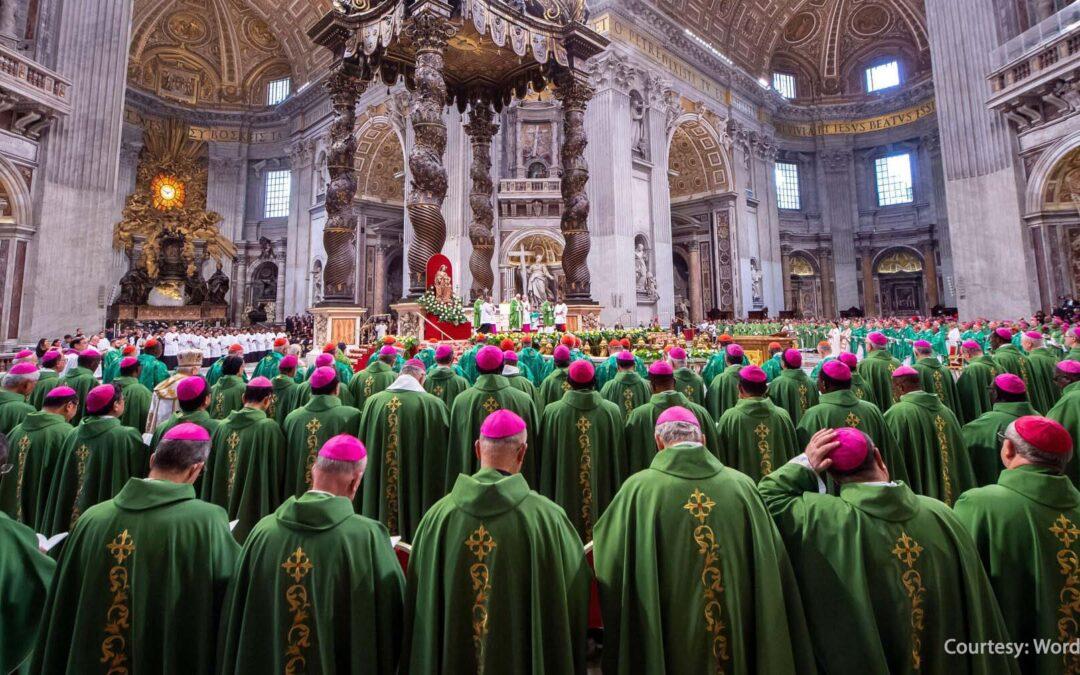Dear Friends,
The Synod’s full document has been released and is forty pages long. Too long for me to put into this format. You can find the full document at the Vatican Website, just look for the English version. However, since I am returning from the pilgrimage to Spain today without time to write you a regular letter, I am going to give you a couple paragraphs from Section 2 of the full Synod document for your reflections:
According to the teaching of the Second Vatican Council, the Church is “a people brought together by virtue of the unity of the Father, the Son and the Holy Spirit”. The Father, through the mission of the Son and the gift of the Spirit, involves us in a dynamism of communion and mission that moves us from the “I” to the “we” and places us at the service of the world. Synodality translates the Trinitarian dynamism with which God comes to meet humanity into spiritual attitudes and ecclesial processes. For this to happen, it is necessary for all the baptized to commit themselves to the reciprocal exercise of their vocation, charism, and ministry. Only in this way can the Church truly become a “conversation” within itself and with the world, walking side by side with every human being in the style of Jesus.
Since the origins, the Church’s synodal journey is oriented toward the Kingdom, which will be fully accomplished when God is all in all. The witness of ecclesial fraternity and missionary dedication to the service of the least will never measure up to the Mystery of which they are also a sign and instrument. The Church does not reflect on its synodal configuration in order to place itself at the center of the proclamation, but to best fulfill, even in its constitutive incompleteness, its service to the coming of the Kingdom.
The renewal of the Christian community is possible only by recognizing the primacy of grace. If spiritual depth is lacking, synodality remains cosmetic. What we are called to, however, is not only to translate into community processes a spiritual experience gained elsewhere, but more deeply to experience how reciprocal relationships are the place and form of an authentic encounter with God. In this sense, while drawing on the rich spiritual heritage of the Tradition, the synodal perspective contributes to renewing its forms: of a prayer open to participation, a discernment lived together, and a missionary energy that arises from sharing and that radiates as service.
Conversation in the Spirit is a tool that, even with its limitations, enables authentic listening in order to discern what the Spirit is saying to the Churches. Its practice has elicited joy, awe and gratitude and has been experienced as a path of renewal that transforms individuals, groups, and the Church. The word “conversation” expresses more than mere dialogue: it interweaves thought and feeling, creating a shared vital space. That is why we can say that conversion is at play in conversation. This is an anthropological reality found in different peoples and cultures, who gather together in solidarity to deal with and decide maters vital to the community. Grace brings this human experience to fruition. Conversing “in the Spirit” means living the experience of sharing in the light of faith and seeking God’s will in an authentically evangelical atmosphere within which the Holy Spirit’s unmistakable voice can be heard.
Since synodality is ordered to mission, Christian communities are to enter into solidarity with those of other religions, convictions and cultures, thus avoiding, on the one hand, the risk of self-referentiality and self-preservation, and on the other hand the risk of loss of identity. The logic of dialogue, expressed in mutual learning and journeying together must come to characterize evangelical proclamation, service to those experiencing poverty, care for our common home, and theological research.
More to come!
Peace,
Fr. Damian



